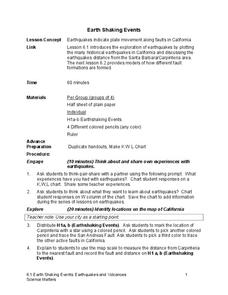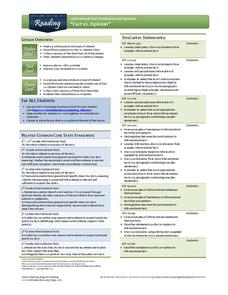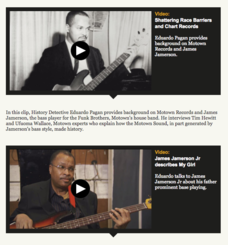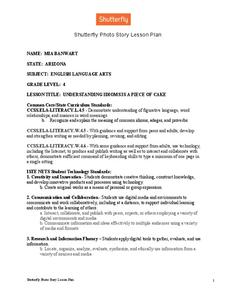EngageNY
Solving General Systems of Linear Equations
Examine the usefulness of matrices when solving linear systems of higher dimensions. The lesson asks learners to write and solve systems of linear equations in four and five variables. Using matrices, pupils solve the systems and apply...
C-SPAN
Choice Board: Expressed and Implied Powers
Article 1, Section 8 of the United States Constitution expressly lists powers given to Congress. Over the years, lawmakers have expanded the enumerated powers to include powers implied by the list. To better understand the significance...
Novelinks
Touching Spirit Bear: The Literary Mandala
Even someone with a dark side can make a good decision—and vice versa. Readers explore Cole's traits and decisions in Ben Mikaelson's Touching Spirit Bear and analyze his sunside and shadowside. They identify a symbol that best...
Novelinks
The House on Mango Street: Question Answer Relationships Strategy
Good readers question text as they read. The Question Answer Relationships Strategy (QAR) used in this resource with The House on Mango Street, provides readers with a concrete approach for questioning Sandra Cisneros' text and...
Center for Learning in Action
Properties of Balls
Enhance your states of matter lessons with a hands-on science investigation that compares six different balls' color, texture, size, weight, ability to bounce, and buoyancy.
EngageNY
Advanced Factoring Strategies for Quadratic Expressions (part 1)
Factoring doesn't have to be intimidating. Build on prior knowledge of multiplying binomials and factoring simple trinomials to teach advanced factoring of quadratic expressions with a lesson that uses various methods of exploring the...
Chicago Botanic Garden
Recognizing Change (Observation vs. Inference)
What is the difference between making inferences and making observations? Young climatologists refer to a PowerPoint to make observations on each slide. They record their observations in a provided worksheet before drawing a...
National Wildlife Federation
Yesterday: Our Energy Needs Over Time
How has our relationship to energy changed over time? An engaging exploration challenges learners to create a timeline showing human energy needs and uses over time. Scholars review what timelines are, choose a 50-year period in history...
Science Matters
Earth Shaking Events
The world's largest measured earthquake happened in 1960 in Chile, reaching a terrifying 9.5 magnitude on the Richter Scale. The second lesson in the 20-part series introduces earthquakes and fault lines. Scholars map where previous...
Science 4 Inquiry
Monster Mash-Up of Genetics
It's alive! Young mad scientists create monsters as they explore the probabilities of genetic traits during a well-structured inquiry lesson. Pairs travel from station to station, rolling the dice and adding traits to their creations as...
National Park Service
A Tale of Two Men
Theodore Roosevelt and the Marquis de Mores were both born in 1858, and both came to the Dakota territory in 1883, but they influenced the developing country of America in different ways. Elementary and middle schoolers apply written and...
Missouri Department of Elementary
Put Yourself in Check
The final lesson in a four-part unit on conflict resolution offers middle schoolers strategies for how to keep themselves in check when involved in conflicts. A role-play activity and a reflective journal stress the importance of...
TryEngineering
Nano Waterproofing
Does your shirt hate water? In the activity, future engineers observe the hydrophobic effect in fabrics. They brainstorm and test some ideas for waterproofing fabrics.
CC Homestead
Summarize
Designed for third graders but appropriate for older learners as well, this packet of materials underscores the necessity of teaching kids how to summarize, how to identify main ideas and supporting details, and how to ask questions...
EngageNY
Rational Numbers on the Number Line
Individuals learn how to plot rational numbers on the number line in the sixth lesson plan of a 21-part module. They identify appropriate units and determine opposites of rational numbers.
Council for Economic Education
Tax Time Scavenger Hunt
Is a 1040EZ tax form really easy? Scholars investigate the complexities of the United States taxation system with an economics lesson. Using a wide variety of web sources, they interpret IRS taxation rules and regulations to better...
For the Teachers
Fact vs. Opinion
Many informational texts are written as factual, but can your learners determine when an opinion is presented as fact? Have your kids read several articles on the same topic and record the statements that contain either facts or...
West Contra Costa Unified School District
Properties of Multiplication
Unlock the keys to fluent multiplication with this upper-elementary math lesson. After an introduction to the five properties of multiplication, students match cards with different math problems to posters describing each property,...
Curated OER
Identifying Economic Systems
Young historians practice identifying evidence to categorize a particular country's economic system as either a mixed, centrally planned, traditional, or free economic system in this two-part lesson.
American Chemical Society
Molecules Matter
Did you know that jumping spiders sometimes wear water droplets as hats? A seventh grade science lesson introduces the concept of what makes up water: tiny molecules that are attracted to each other. Starting with a chemistry discussion,...
Delegation of the European Union to the United States
The European Union’s Economic and Monetary Union
What are the benefits of using the Euro, the EU's common currency? What are the challenges faced? As their examination of the European Union continues, class members investigate the impact on how the switch to the Euro impacted...
Polk County Public Schools
Suffragists
The Women's Rights movement is the focus of an engaging and collaborative exercise, in which young historians use information found in textbooks, class notes, and the provided documents to craft a DBQ essay.
PBS
The Sixties: Hitsville USA
James Jamerson. You probably heard him but may not have heard of him. But fans of Motown Records will certainly recognize his contributions to the sound that desegregated popular music during the 1960s. Challenge young history detectives...
Shutterfly
Photo Story Lesson Plan
After reading Loree Leedy's There's a Frog in My Throat: 440 Animal Sayings a Little Bird Told Me, kids create and illustrate their own poems that convey the meaning of an idiom. The poems are then transferred into Shutterfly's Photo...

























